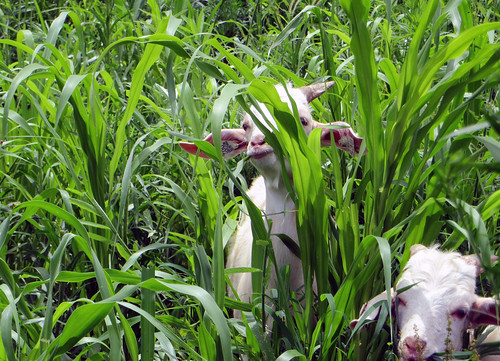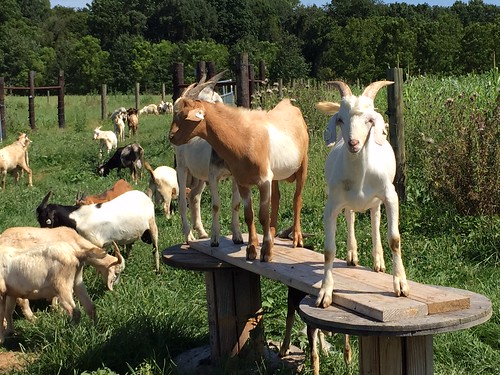The 2016 Western Maryland Pasture-Based Meat Goat Performance Test will follow a similar schedule as last year. The test will have a 13-day adjustment period, followed by an 84-day test. The first half of the test will serve as a "growth challenge," whereas the second half of the test will serve as a "parasite challenge."
The nomination period for the 2016 test is April 15 through June 1. All nominations received by the deadline will be treated equally. If nominations exceed test capacity (approximately 90 goats), preference will be given to Maryland residents and previous consignors.
Nomination packets will be mailed to 2014 and 2015 consignors during the first week of April. Additional packets may be requested from Pam Thomas at (301) 432-2767 x343 or pthomas@umd.edu. All documents in the nomination packet may also be obtained from this blog (right hand column).
Goats must be delivered to the test site on Friday, June 24, 7 a.m. to 2 p.m. Earlier deliveries are possible, if arrangements are made ahead of time. Starting weights will be determined on July 7-8. The goats will be handled every two weeks (on Thursdays) to determine body weights, FAMACHA©, body condition, coat condition, dag, and fecal consistency scores. Fecal samples will be collected bi-weekly to determine fecal egg counts (FECs). Pooled samples will be collected periodically to determine parasite burden and diet quality.
Final weights will be determined on September 29-30. At the conclusion of the test, goats must be picked up. There will be no sale associated with the test. All goats, including the ten top-performing goats may be sold via private treaty or returned to their respective farms for breeding.
It is suggested that some of the top-performing bucks be sold (as yearlings) at the Bluegrass Performance Invitational in Frankfort, Kentucky. Arrangements can also be made to sell the goats locally (to a sale barn or for finishing). The goats will not be sold until all data has been analyzed and the ten top-performing goats have been selected.
April 15-June 1 - nomination period
------------------
June 24 - goats delivered to test site
July 7 (day 0) - starting weights determined
July 8 - re-weigh goats to determine starting weights
------------------
July 21 (day 14)
August 3 (day 28)
August 18 (day 42)
------------------
September 1 (day 56)
September 15 (day 70)
September 29 (day 84)
September 30 - re-weigh goats to determine ending weights
------------------
September 9 - pick up goats
Towards the end of the test, the goats will be scanned to determine carcass muscling (rib eye area). They will also be evaluated for structural correctness (feet, legs, hooves, mouths) and reproductive soundness (teats, testicles).
The top-ten bucks will be selected primarily on the basis of growth (average daily gain), parasite resistance (fecal egg counts), and parasite resilience (FAMACHA© scores and anthelmintic treatments). Awards will be given to the top-performing buck, as well as the top consignor (based on performance of three bucks). Five and ten year consignors are recognized.
The nomination period for the 2016 test is April 15 through June 1. All nominations received by the deadline will be treated equally. If nominations exceed test capacity (approximately 90 goats), preference will be given to Maryland residents and previous consignors.
 |
| Munching on millet in last year's test |
Nomination packets will be mailed to 2014 and 2015 consignors during the first week of April. Additional packets may be requested from Pam Thomas at (301) 432-2767 x343 or pthomas@umd.edu. All documents in the nomination packet may also be obtained from this blog (right hand column).
Goats must be delivered to the test site on Friday, June 24, 7 a.m. to 2 p.m. Earlier deliveries are possible, if arrangements are made ahead of time. Starting weights will be determined on July 7-8. The goats will be handled every two weeks (on Thursdays) to determine body weights, FAMACHA©, body condition, coat condition, dag, and fecal consistency scores. Fecal samples will be collected bi-weekly to determine fecal egg counts (FECs). Pooled samples will be collected periodically to determine parasite burden and diet quality.
Final weights will be determined on September 29-30. At the conclusion of the test, goats must be picked up. There will be no sale associated with the test. All goats, including the ten top-performing goats may be sold via private treaty or returned to their respective farms for breeding.
 |
| Congregating in the central lane-way. |
It is suggested that some of the top-performing bucks be sold (as yearlings) at the Bluegrass Performance Invitational in Frankfort, Kentucky. Arrangements can also be made to sell the goats locally (to a sale barn or for finishing). The goats will not be sold until all data has been analyzed and the ten top-performing goats have been selected.
April 15-June 1 - nomination period
------------------
June 24 - goats delivered to test site
July 7 (day 0) - starting weights determined
July 8 - re-weigh goats to determine starting weights
------------------
July 21 (day 14)
August 3 (day 28)
August 18 (day 42)
------------------
September 1 (day 56)
September 15 (day 70)
September 29 (day 84)
September 30 - re-weigh goats to determine ending weights
------------------
September 9 - pick up goats
Towards the end of the test, the goats will be scanned to determine carcass muscling (rib eye area). They will also be evaluated for structural correctness (feet, legs, hooves, mouths) and reproductive soundness (teats, testicles).
The top-ten bucks will be selected primarily on the basis of growth (average daily gain), parasite resistance (fecal egg counts), and parasite resilience (FAMACHA© scores and anthelmintic treatments). Awards will be given to the top-performing buck, as well as the top consignor (based on performance of three bucks). Five and ten year consignors are recognized.











